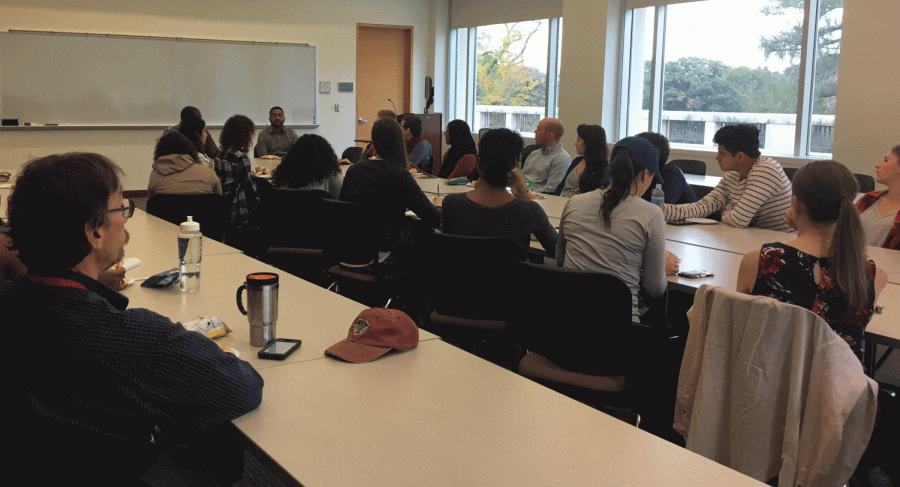‘Colgate Conversations’ Brown Bag Facilitates Student Dialogue on Greek Life at Colgate
On Monday, October 17, members of the Colgate community gathered in the Batza Room at Case Library for a brown bag titled “The Voices of Fraternities and Sororities.” This brown bag was the third in the Colgate Conversations series. Former Interim Director of Fraternities and Sororities, Bilal Badruddin, led the discussion. Over the course of an hour, Badruddin opened the conversation to questions, comments and concerns about Greek organizations. Specifically, the conversation analyzed and reassessed Greek life in terms of diversity, social identity, power dynamics and privilege. Badruddin mediated the dialogue, providing his own insights and personal experiences.
Badruddin started the discussion by pointing out the broad influence of Greek life on college campuses across the country. He also spoke extensively about his own experience in Greek life, both as a student and in his current involvement with his organization.“We often forget to recognize Greek organizations beyond their presence on Colgate’s campus,” Badruddin said. “The same questions and issues we have regarding Greek life can be applied on a national level.”
After providing a short history of fraternities and sororities, both nationally and at Colgate, Badruddin opened the conversation to the brown bag attendees.The dialogue among attendees was initially focused on what the experiences of those in Greek life entail, as well as the goals of these organizations. Badruddin recognized the stereotypes and generalizations often associated with these groups, but he encouraged listeners to think about Greek life in a more nuanced way. The missions of Greek organizations, Badruddin explained, are unique to their respective chapters. The values and objectives of individual Greek organizations can often be seen through their specific new member education processes.
The next question revolved around the economic structure of Greek organizations, specifically about the dues and costs associated with joining an organization. Inquiries were made regarding the prospect of exclusivity and the implications of privilege within fraternities and sororities.
“Regardless of status or social identity, there is an inherent level of privilege that comes with being in a fraternity or sorority,” Badruddin said. Badruddin acknowledged that financial obligations are potential hurdles for fraternities and sororities. These economic issues, however, can be recognized at both an individual and chapter-wide level. He explained that while a smaller, culturally-oriented organization may have lower dues, the chapter as a whole will typically be more dependent on the money. Conversely, a larger, non-cultural chapter may have higher dues but will be less dependent on each member’s payment of the dues.
At Colgate, the Panhellenic Council, which oversees the three sororities on campus, offers scholarships to offset the cost of dues during the first semester of membership. Recipients are chosen through an anonymous application process. Additionally, after one semester of involvement in a Greek organization, national scholarships are available to students through their specific organization.
The discussion then shifted to the status of Greek life at Colgate. The Gamma Sigma chapter of Delta Delta Delta at Colgate recently released a statement expressing an acceptance policy that acknowledged and embraced different kinds of women who may not conform to traditional gender expressions. The organization pledged to support women of all identities and backgrounds. Badruddin’s hope is that this will promote inclusivity and create a safer space on campus. Colgate’s Greek system currently includes eight organizations, recognized nationally by the Interfraternity Council or the National Panhellenic Association. Multiple students emphasized the need for cultural, gender and identity-based Greek organizations on campus, and the conversation touched on efforts that students have taken to push for this extension. Although Colgate has interest groups, like The Commons, Brothers and OASIS, that foster similar feelings of fellowship, students have argued that they are simply different from Greek organizations. A number of students voiced their questions and concerns during the open discussion, but many chose not to disclose their names.







